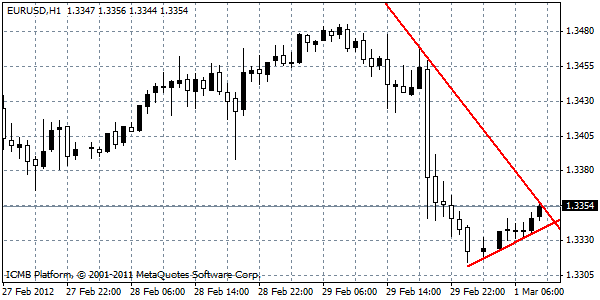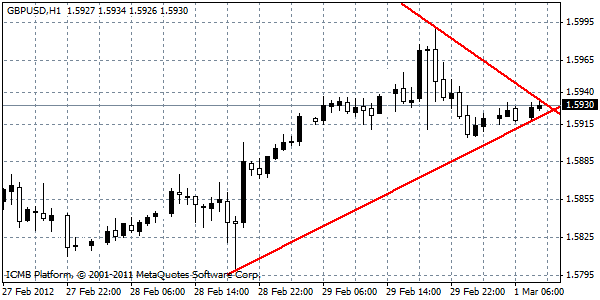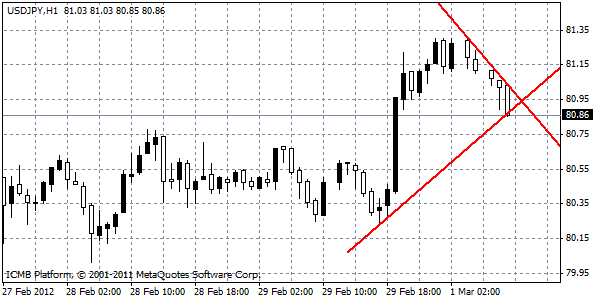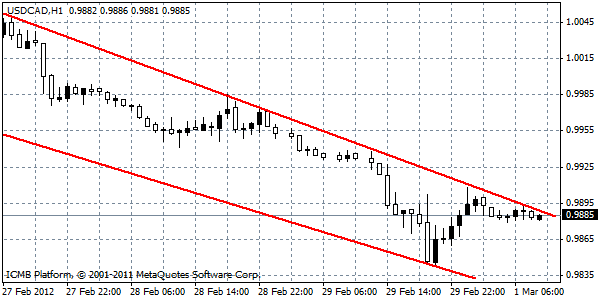Greece’s parliament approved cuts in pensions and health care a day after ratifying a 3.2 billion euro ($4.3 billion) package of spending reductions to move closer to a rescue package to avert financial collapse. Lawmakers voted 213-58 in favor of the law. Approval in parliament allows Prime Minister Lucas Papademos to meet with euro-area partners this week having met most of the conditions demanded by the European Union and IMF or Greece to get a lifeline of 130 billion Euros. Finance ministers from the region will discuss the second Greek rescue program in Brussels today. European governments moved toward a second rescue of Greece on Feb. 21, calculating that the cost of a fresh bailout, which includes a write-down of about 100 billion Euros of Greek debt, is a price worth paying to prevent a financial collapse that could shatter the euro area. Pension and wage cuts are reducing state spending and changes to labor rules are liberalizing the jobs market. The measures are also driving the economy deeper into a recession and fanning discontent among Greeks as unemployment has jumped to 21 percent. The economy shrank 6.8 percent last year and is set to contract for a fifth year in 2012. EUR/USD" title="EUR/USD" width="600" height="600">
EUR/USD" title="EUR/USD" width="600" height="600">
GBP/USD
Bank of England policy maker Martin Weale said that U.K. inflation may prove more persistent than expected, making it unlikely the economy will require further stimulus once the current round of bond purchases ends. Higher oil prices and potential wage pressures as the economy recovers suggest a risk that there may be more persistence to inflation than one might expect at a time of rising unemployment and weak demand. Policy maker Paul Fisher said on Feb. 26 that the risk of the U.K. slipping into another recession may have been avoided, and if a positive trend continues, that would put more weight onto the argument for stopping rather than carrying on with more bond purchases. The MPC voted to increase stimulus to 325 billion pounds on Feb. 9 after the economy shrank 0.2 percent in the fourth quarter. The new round of purchases is scheduled to be completed in May.U.K. inflation slowed to 3.6 percent in January, the least in 14 months. GBP/USD" title="GBP/USD" width="600" height="600">
GBP/USD" title="GBP/USD" width="600" height="600">
USD/JPY
Japanese companies’ capital spending jumped by the most in almost five years in the fourth quarter, adding to signs that the world’s third-biggest economy is set to return to growth. Capital spending excluding software rose 4.9 percent from a year earlier, after declining 11 percent in the previous quarter, the Finance Ministry said today in Tokyo. The first gain in three quarters compared with a median estimate of a 7.4 percent decline. A weakening yen, gains in industrial production and retail sales, and increased government spending on reconstruction from last year’s earthquake may drive an expansion this quarter. Today’s report may force the Cabinet Office to revise upward preliminary data that showed gross domestic product shrank an annualized 2.3 percent in the final three months of last year. Reconstruction demand was probably the biggest support for the increase in capital spending. The upward trend in business investment is likely to continue as companies become more optimistic as rebuilding demand materializes more and the yen weakens. The Nikkei 225 Stock Average rose 1 percent as of 9.52 a.m. in Tokyo on better-than-expected U.S. economic data, the Japanese spending report and weakness in the yen. The yen traded at 81.21 per dollar, compared with a postwar high of 75.35 on Oct. 31. The currency has declined, aiding exporters, since the Bank of Japan announced extra monetary stimulus and set an inflation goal on Feb. 14. USD/JPY" title="USD/JPY" width="600" height="600">
USD/JPY" title="USD/JPY" width="600" height="600">
USD/CAD
Canada’s dollar rose to the highest level in more than five months against its U.S. counterpart as the European Central Bank awarded a record amount of loans to euro-area banks to avert a credit crunch. The currency rallied against all but one of its 16 most-traded peers, Taiwan’s dollar, as portfolio managers sold the U.S. dollar to rebalance holdings at month-end relative to stock gains. It has risen 1.3 percent this month versus the greenback. The U.S. economy grew last quarter more than forecast, data showed, and Federal Reserve Chairman Ben S. Bernanke damped bets policy makers will provide more monetary stimulus. We seem to have seen a large amount of Canadian-dollar buying related to month-end. It may also reflect the fact that the market is less leveraged to the Canadian dollar. Canada’s currency, nicknamed the loonie for the image of the aquatic bird on the C$1 coin, appreciated 0.5 percent to 98.99 cents per U.S. dollar in Toronto. It strengthened to as much as 1.1 percent to 98.45 cents, the highest since Sept. 19.The Canadian currency has gained 3.2 percent in 2012 versus the U.S. dollar on increased demand for higher-yielding assets. It fell 2.3 percent last year. USD/CAD" title="USD/CAD" width="600" height="600">
USD/CAD" title="USD/CAD" width="600" height="600">
- English (UK)
- English (India)
- English (Canada)
- English (Australia)
- English (South Africa)
- English (Philippines)
- English (Nigeria)
- Deutsch
- Español (España)
- Español (México)
- Français
- Italiano
- Nederlands
- Português (Portugal)
- Polski
- Português (Brasil)
- Русский
- Türkçe
- العربية
- Ελληνικά
- Svenska
- Suomi
- עברית
- 日本語
- 한국어
- 简体中文
- 繁體中文
- Bahasa Indonesia
- Bahasa Melayu
- ไทย
- Tiếng Việt
- हिंदी
Major Currency Pairs Analysis: March 01, 2012
Published 03/01/2012, 08:15 AM
Updated 04/25/2018, 04:40 AM
Major Currency Pairs Analysis: March 01, 2012
EUR/USD
3rd party Ad. Not an offer or recommendation by Investing.com. See disclosure here or
remove ads
.
Latest comments
Install Our App
Risk Disclosure: Trading in financial instruments and/or cryptocurrencies involves high risks including the risk of losing some, or all, of your investment amount, and may not be suitable for all investors. Prices of cryptocurrencies are extremely volatile and may be affected by external factors such as financial, regulatory or political events. Trading on margin increases the financial risks.
Before deciding to trade in financial instrument or cryptocurrencies you should be fully informed of the risks and costs associated with trading the financial markets, carefully consider your investment objectives, level of experience, and risk appetite, and seek professional advice where needed.
Fusion Media would like to remind you that the data contained in this website is not necessarily real-time nor accurate. The data and prices on the website are not necessarily provided by any market or exchange, but may be provided by market makers, and so prices may not be accurate and may differ from the actual price at any given market, meaning prices are indicative and not appropriate for trading purposes. Fusion Media and any provider of the data contained in this website will not accept liability for any loss or damage as a result of your trading, or your reliance on the information contained within this website.
It is prohibited to use, store, reproduce, display, modify, transmit or distribute the data contained in this website without the explicit prior written permission of Fusion Media and/or the data provider. All intellectual property rights are reserved by the providers and/or the exchange providing the data contained in this website.
Fusion Media may be compensated by the advertisers that appear on the website, based on your interaction with the advertisements or advertisers.
Before deciding to trade in financial instrument or cryptocurrencies you should be fully informed of the risks and costs associated with trading the financial markets, carefully consider your investment objectives, level of experience, and risk appetite, and seek professional advice where needed.
Fusion Media would like to remind you that the data contained in this website is not necessarily real-time nor accurate. The data and prices on the website are not necessarily provided by any market or exchange, but may be provided by market makers, and so prices may not be accurate and may differ from the actual price at any given market, meaning prices are indicative and not appropriate for trading purposes. Fusion Media and any provider of the data contained in this website will not accept liability for any loss or damage as a result of your trading, or your reliance on the information contained within this website.
It is prohibited to use, store, reproduce, display, modify, transmit or distribute the data contained in this website without the explicit prior written permission of Fusion Media and/or the data provider. All intellectual property rights are reserved by the providers and/or the exchange providing the data contained in this website.
Fusion Media may be compensated by the advertisers that appear on the website, based on your interaction with the advertisements or advertisers.
© 2007-2024 - Fusion Media Limited. All Rights Reserved.
